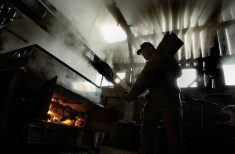In the months after U.S. President Donald Trump was elected to the Oval Office, the Trudeau government launched a major charm offensive.
Minister after minister headed south for meetings with American officials including congressmen, senators, governors and senior staff within the Trump administration.
Parliamentary committees travelled south to meet with their American counterparts and Canadians became the keynote speakers at conventions and conferences across the United States.
Even provincial premiers, leading Canadian businesses and industry groups were involved.
The charm offensive was met with mixed responses from American businesses and officials.
Read Also

Ontario’s agri-food sector sets sights on future with Agri-Food 2050 initiative
The first-ever Agri Food 2050, a one-day industry event dedicated to envisioning the future of food and farming in Ontario,…
Some were frustrated by the unity front. Others insisted the maneuver was extremely effective and marvelled at how domestic politics and political differences failed to divide the charm offensive’s participants.
Canada’s trade team was a smiling, united and stubborn front.
Fast-forward to now and it appears the Trudeau government is on the brink of launching the Canadian Charm Offensive 2.0.
This time, the target seems to be China.
For starters, three cabinet ministers are headed to the Asian-superpower for meetings over the next few weeks.
First up is Agriculture Minister Lawrence MacAulay, who is set to spend eight days in China, spread out between Shanghai, Qingdao and Beijing, where he will visit trade shows and meet with Chinese officials.
It’s MacAulay’s third trip to China in as many years.
His visit comes just weeks after China’s agriculture minister, Han Changfu, travelled to Ottawa and Montreal — a visit that garnered little fanfare despite the fact China is Canada’s second largest market when it comes to agricultural goods.
For Canadian farmers, the Chinese market is rapidly evolving and its untapped potential has left the agriculture and agri-food sector here at home eager to feed China’s growing middle class.
However, MacAulay isn’t the only minister headed abroad.
International Trade Minister Jim Carr and Finance Minister Bill Morneau are headed to Beijing for a two-day trip that starts one day after MacAulay is set to leave Beijing.
Carr and Morneau’s visit is said to be a business trip and is not related to trade.
The latest Canadian charm offensive comes as Canada’s trade relationship with China is under intense scrutiny thanks to a controversial clause included within the United States-Canada-Mexico trade agreement.
The USMCA clause allows members nations to withdraw from the agreement with six months notice should a partner start free trade agreements with a non-market economy.
China is considered to be a non-market economy.
The USMCA clause has infuriated Beijing, which has insisted it will continue to negotiate trade deals at its own pace and with whomever it pleases.
The Canadian government, for its part, has insisted the clause does not prevent Canada from engaging in trade talks with China, notably on a sector-by-sector basis.
However, trade experts insist the policy will make it difficult to negotiate a free trade agreement with China. Canada and China have been engaged in exploratory free trade talks since 2016. Formal talks have not begun.
Trade experts have also insisted the clause’s inclusion within the USMCA means Canada now finds itself smack dab in the middle of the ongoing trade war between Washington and Beijing — a dispute that, at this point, does not seem to have a resolution in sight.
Whether this latest Canadian charm offensive will sway Beijing in Canada’s favour is anyone’s guess. The path forward is delicate and complex with no clear end in sight.
So, for now, it’s all about the charm.















